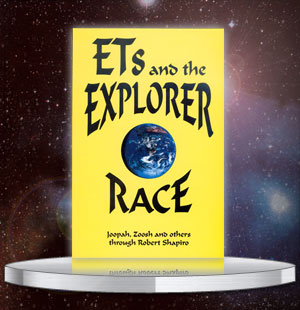- The Explorer Race
- ETs & The Explorer Race
- Origins & the Next 50 Years
- Creators & Friends
- Particle Personalities
- Explorer Race & Beyond
- Council of Creators
- Explorer Race & Isis
- Explorer Race & Jesus
- Earth History
- ET Visitors Speak
- Generating Safety
- Animal Souls Speak
- Astrology: Planet Personalities and Signs Speak
- ET Visitors Speak Vol.2
- Plant Souls Speak
- Time and the Transition to Natural Time
- ETs on Earth, Volume 1
- ETs on Earth, Volume 2
- Shining The Light
- Shining The Light
- Shining The Light
- Shining The Light
- Shining The Light
- Shining The Light
- Shining The Light
ETs & The Explorer Race

Introduction
The purpose of this book that you are holding in your hands is to guide you toward acceptance of the differences amongst you all, as well as acceptance of the wide variety of life that the universe has in store for you.
It is ironic that the Zeta beings, of whom Joopah is a portion, regard you as their past lives but you have not yet come to terms with their apperance. If we could have you change for a moment your atitude about who's an ET and who isn't, then imagine that all the animals and insects, the butterflies, birds, deer, fish, all these beings on your Earth right now, are from other planets — which, as a matter of fact, they are — and that on their planets they have their own cultures and perhaps appear differently.
Now imagine for a moment that the ETs have arrived in a flying saucer and landed, proverbially, on the White House lawn. But no body comes out of the ship. Security guards, the press, maybe the President are all there to say, "Well, who's here?" No thing happens. And the people don't know what to do. They wait for a while as the beings inside the craft are projecting goodwill and telepathic resonance and so on. Nothing happens, and the beings inside the ship realize, "Wait a minute — these people don't understand telepathy. How are we going to communicate with them?" So they have a discussion on board and they say, "We'll have to invite them aboard, because we surely could not go out there: So they open the door just a little bit, with a "bzzzz," and someone comes up the stairs and peeps in — possibly someone with security, possibly a person from the State Department, maybe a diplomat — and walks inside the ship.
Of course, it's unusual. Its inner corridors and everything tend to be some what circular by the nature of the shape of the vehicle. They walk in a little bit farther; it's kind of damp and humid in there — not what you would expect if you were expecting a vehicle crammed with electronics, but the electronics are not apparent. So this diplomat looks around the ship, and suddenly, over against a far wall there is a low hum. A panel slides away, and the diplomat finds himself or herself looking at what is basically a fish tank, with fish swimming around in there. The diplomat thinks, Oh, these ETs are trying to show something in common — that they carry pets just like Earth people have pets. But suddenly, because he's within the insulated environs of the ship, he hears a voice in his head. It says, "What pets? We're the ETs."
I mention this to you because in order for you to appreciate the appearance of ETs — and granted, many of them look very much like you, but they don't all — you need to begin to accept as equals what you call animals. Just because you don't understand their language and their ways of being and their attitudes, this kind of thing is proof that they are from someplace else; they are not from your culture . Begin to consider what you call animals — especially insects like ants; ants are some of the most advanced creatures on your planet. If you can begin to consider them as extraterrestrials who are just visiting here, serving you as you evolve toward being the Explorer Race, then you will truly begin to appreciate that ETs might very well look very different.
Now, the chances of your meeting an ant three stories tall are zero. Granted, they are a little bit larger on their home planet, but by "larger" I mean maybe only two or three inches long. But they have no need for great size, because on their home planet they do not have the wealth of resources you have here. They can't be too big, otherwise there wouldn't be enough to go around.
I want you to unde rstand that the next leap you really have to make is accepting ETs for how they look, because nobody — and many of you reading this know this — likes to be rejected just because of the way they look. So practice with each ot her, learn how to accept each other and to be curious about each other's differences, and in this way you will be preparing truly to meet your ET friends.
Zoosh
through Robert Shapiro
AII right. This is Joopah, hello. I would like to say to all of my Earth companions, welcome to this book which, while not completely my perspective, has some of my perspective in it. I want you to enjoy it as much as you can and let it stimulate your imagination. We know now that you are our past lives, and this is why we cherish you so. Please know that my people are slow in becoming as sophisticated as you are, with all of your contact with unusual races of beings. Even on our planet, the idea of animals is something new, and we don't quite know what to do with the idea of a separate species. You see, we are all truly one, not only with our teachers on our planets, but also with each other.
And we are one with you, too. We know that you are our past lives. We didn't always know that, but we know it now. So understand that we truly do cherish you, and please, please know that you can call us Zetas. We do not need to be called by our color, and we are not all gray. Those from Zeta Reticuli do have that appearance, but I'll let you in on a little secret: Part of the reason we have that appearance is because of a unit we use to protect us from the eneries on Earth, which are energies we are not used to. And this unit emits a silver light that goes all around and over our bodies and causes us to look a little bit more gray than we really do look. Some of us are actually sort of a pale white — beige, you might call it — although many of our people are very light gray.
Know that we will look forward to meeting you explorers as you come out to the stars, and we will help you in every way we can. Please enjoy the book.
Joopah
through Robert Shapiro
Softcover, 237 pgs.
ISBN: 978-0-929385-79-2
Table of Contents
Download the full table of contents (PDF)
- The Great Experiment: Earth Humanity . . . . . . 1
- ETs Talk to Contactees . . . . . . 23
- Becoming One with Your Future Self . . . . . . 43
- ET Interaction with Humanity . . . . . . 55
- UFOs and Abductions . . . . . . 71
- The True Nature of the Grays . . . . . . 93
- Answering Questions in Las Vegas . . . . . . 111
- UFO Encounters in Sedona . . . . . . 123
- Joopah, in Transit, Gives an Overview and Helpful Tools . . . . . . 139
- We Must Embrace the Zetas . . . . . . 157
- Roswell , ETs and the Shadow Government . . . . . . 173
- ETs: Friend or Foe? . . . . . . 187
- ET Presence within Earth and Human Genetics . . . . . . 205
- Creating a Benevolent Future . . . . . . 213
- Bringing the Babies Home . . . . . . 225





